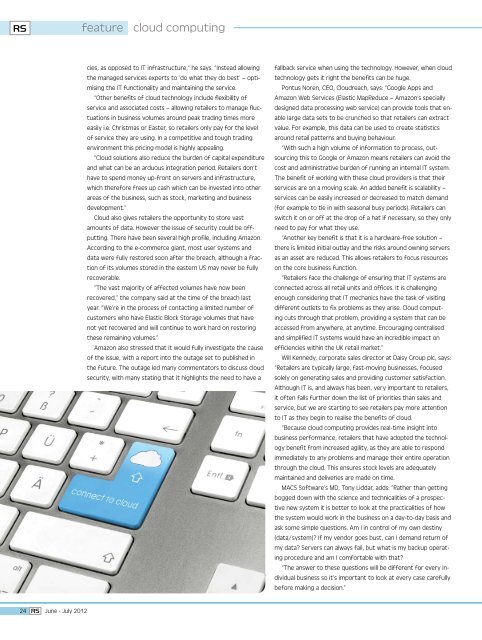payments - Retail Systems
payments - Retail Systems
payments - Retail Systems
Create successful ePaper yourself
Turn your PDF publications into a flip-book with our unique Google optimized e-Paper software.
RS<br />
24 RS June - July 2012<br />
feature cloud computing<br />
cies, as opposed to IT infrastructure,” he says. “Instead allowing<br />
the managed services experts to ‘do what they do best’ – optimising<br />
the IT functionality and maintaining the service.<br />
“Other benefits of cloud technology include flexibility of<br />
service and associated costs – allowing retailers to manage fluctuations<br />
in business volumes around peak trading times more<br />
easily i.e. Christmas or Easter, so retailers only pay for the level<br />
of service they are using. In a competitive and tough trading<br />
environment this pricing model is highly appealing.<br />
“Cloud solutions also reduce the burden of capital expenditure<br />
and what can be an arduous integration period. <strong>Retail</strong>ers don’t<br />
have to spend money up-front on servers and infrastructure,<br />
which therefore frees up cash which can be invested into other<br />
areas of the business, such as stock, marketing and business<br />
development.”<br />
Cloud also gives retailers the opportunity to store vast<br />
amounts of data. However the issue of security could be offputting.<br />
There have been several high profile, including Amazon.<br />
According to the e-commerce giant, most user systems and<br />
data were fully restored soon after the breach, although a fraction<br />
of its volumes stored in the eastern US may never be fully<br />
recoverable.<br />
“The vast majority of affected volumes have now been<br />
recovered,” the company said at the time of the breach last<br />
year. “We’re in the process of contacting a limited number of<br />
customers who have Elastic Block Storage volumes that have<br />
not yet recovered and will continue to work hard on restoring<br />
these remaining volumes.”<br />
Amazon also stressed that it would fully investigate the cause<br />
of the issue, with a report into the outage set to published in<br />
the future. The outage led many commentators to discuss cloud<br />
security, with many stating that it highlights the need to have a<br />
fallback service when using the technology. However, when cloud<br />
technology gets it right the benefits can be huge.<br />
Pontus Noren, CEO, Cloudreach, says: “Google Apps and<br />
Amazon Web Services (Elastic MapReduce – Amazon’s specially<br />
designed data processing web service) can provide tools that enable<br />
large data sets to be crunched so that retailers can extract<br />
value. For example, this data can be used to create statistics<br />
around retail patterns and buying behaviour.<br />
“With such a high volume of information to process, outsourcing<br />
this to Google or Amazon means retailers can avoid the<br />
cost and administrative burden of running an internal IT system.<br />
The benefit of working with these cloud providers is that their<br />
services are on a moving scale. An added benefit is scalability –<br />
services can be easily increased or decreased to match demand<br />
(for example to tie in with seasonal busy periods). <strong>Retail</strong>ers can<br />
switch it on or off at the drop of a hat if necessary, so they only<br />
need to pay for what they use.<br />
“Another key benefit is that it is a hardware-free solution –<br />
there is limited initial outlay and the risks around owning servers<br />
as an asset are reduced. This allows retailers to focus resources<br />
on the core business function.<br />
“<strong>Retail</strong>ers face the challenge of ensuring that IT systems are<br />
connected across all retail units and offices. It is challenging<br />
enough considering that IT mechanics have the task of visiting<br />
different outlets to fix problems as they arise. Cloud computing<br />
cuts through that problem, providing a system that can be<br />
accessed from anywhere, at anytime. Encouraging centralised<br />
and simplified IT systems would have an incredible impact on<br />
efficiencies within the UK retail market.”<br />
Will Kennedy, corporate sales director at Daisy Group plc, says:<br />
“<strong>Retail</strong>ers are typically large, fast-moving businesses, focused<br />
solely on generating sales and providing customer satisfaction.<br />
Although IT is, and always has been, very important to retailers,<br />
it often falls further down the list of priorities than sales and<br />
service, but we are starting to see retailers pay more attention<br />
to IT as they begin to realise the benefits of cloud.<br />
“Because cloud computing provides real-time insight into<br />
business performance, retailers that have adopted the technology<br />
benefit from increased agility, as they are able to respond<br />
immediately to any problems and manage their entire operation<br />
through the cloud. This ensures stock levels are adequately<br />
maintained and deliveries are made on time.<br />
MACS Software’s MD, Tony Liddar, adds: “Rather than getting<br />
bogged down with the science and technicalities of a prospective<br />
new system it is better to look at the practicalities of how<br />
the system would work in the business on a day-to-day basis and<br />
ask some simple questions. Am I in control of my own destiny<br />
(data/system)? If my vendor goes bust, can I demand return of<br />
my data? Servers can always fail, but what is my backup operating<br />
procedure and am I comfortable with that?<br />
“The answer to these questions will be different for every individual<br />
business so it’s important to look at every case carefully<br />
before making a decision.”


